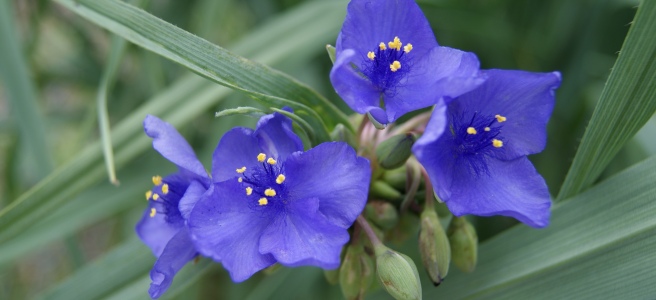It is sufficiently remarkable that a great and powerful noble should have accepted so frank a criticism from a peasant, little more than a child. He was more accustomed to see such people tremble in his presence. Such impertinence must have taken his breath away. Besides, it attacked him in his most private feelings.
-Vita Sackville-West
Saint Joan of Arc; 1936
I like to learn things. A “natural curiosity”, as my Grandma calls it, will keep one from being bored. In fact, in my house, the word “bored” is considered a bad word. It strikes me right to my core when my children say they are bored, because all that means to me is that they haven’t yet learned the ability to entertain themselves or they themselves are boring.
We have spiderwort plant growing behind our fence, completely neglected. It was growing there when we moved in and we left it. There was not much we cared to do with that plot of land anyway. It is a scraggly, sloppy looking thing. It just hangs there with its electric blue flowers that only seem to minimally dot the green foliage from afar. I never thought much of it, in fact, I’ve always observed it as an ugly plant. But as I’ve learned many times in life and in the garden, it is easy to make enemies of those we don’t know well.

So let us get to know the spiderwort a little better, and perhaps from now on the sight of it won’t aggravate me. We will perhaps satisfy our natural curiosity in doing so…
The unfortunately named spiderwort actually has many good qualities, and it has proved itself a very useful plant for centuries.
The word ‘wort’ originated in Middle English. Middle English; think Chaucer’s Canterbury Tales. ca. 1343-1400
“Whan that April With his showres soote
The droughte of March hath perced to the roote,
And bathed every veine in swich licour,
Of which vertu engendred is the flowr…”
I could read Chaucer all day but alas, we must continue with today’s acquaintance. The word ‘wort’ applies to plants or herbs used for medicinal reasons. The root of the spiderwort are used as a laxative. Brewed into a tea, they will help with numerous stomach ailments, including kidney pains and “women’s complaints”.
Its flower, the electric blue stars that smile with yellow stamens, can actually be eaten. I can imagine it used as a decorative edible garnish for a summer dinner party in the garden. The sun sets in the background as your glass of Sauvignon Blanc politely sweats in the warm summer night air, while you get the pleasure of studying solely this flower at close range.

Perhaps while you’re at it, you’d like to use its tender young leaves in your salad? Yes, you can! Forget the romaine, walk a little further to that forsaken plant round the corner and pluck some leaves to add something a little different; texture or otherwise.
Speaking of its leaves, the larger ones contain a mucus that can be used as a healing ointment. This is also where the word ‘spider’ comes from. If you tear a single leaf, this mucus-like substance will thread and stretch just like a spider web.
Well? What say you? Will you look on with disdain and turn your nose up at the spiderwort? Or have you gained a new appreciation because you’ve gotten to know it better? Personally, I’ll take the later response. From now on it will remind me of the days centuries ago when Chaucer wrote of the great pilgrimage, and Middle English reigned in the world of literature. Perhaps the peasant is the noble one after all.




I had never heard of this flower before! Do you know what area it typically grows in?
LikeLiked by 1 person
It grows here in Michigan as a wildflower and I’ve seen it for sale in miseries here too. We’re in zone five, and I know it grows in England zone 6 I believe, because it was named after an English gardener. 🙂
LikeLiked by 1 person
It’s genus name that is..
LikeLiked by 1 person
Well, isn’t that a coincidence? I have nurtured and protected such a plant for 29 years in my back garden borde no knowing what it was but looking forward every summer to those beautiful cobalt flowers! They hardly last five minutes, but I love them and have prevented husband and various over-enthusiastic gardeners from digging it up out of season believing it to be couch grass or the like. Thank you for naming it and giving it an identity. I love Chaucer, too! And Vita’s close friend, Virginia. 💐
LikeLiked by 1 person
Wow! That is a coincidence! I’m glad I could help, now you really have a reason to keep it as it has so many uses!
LikeLike
We are also in zone 5. A neighbor gave me some spiderwort long ago…decades ago. It sort of survived in spite of my neglect, but then disappeared and was not mourned. But then a week or so ago, walking in my “tree garden” as I call my (mostly) volunteer area…there was a spiderwort plant growing and blooming right along side a fallen branch which is covered with lovely fungi and which I have been thinking of cultivating a garden niche there. Thanks for posting the photos! This plant can actually be quite attractive in a semi-weed garden area. 🙂
LikeLiked by 1 person
I love this plant and am so happy you pay tribute to it!
LikeLiked by 1 person
Thank you!
LikeLike
We call those Widow Tears (a guy in NE said they call then cow slobber?? not fitting such a beautiful flower?!). My mothers saying was “only boring people get bored”.. think this was to keep us thinking up new ideas – it worked LOL.
LikeLiked by 1 person